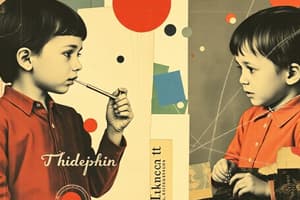Podcast
Questions and Answers
What is the experimenter expectancy effect?
What is the experimenter expectancy effect?
- A phenomenon that leads to bias in study outcomes due to researchers' hypotheses (correct)
- A technique to collect unbiased data
- A method of ensuring absolute objectivity in experiments
- A way to enhance participant engagement
What is a double-blind study?
What is a double-blind study?
Neither researchers nor participants are aware of who is in the experimental or control group.
Who bought the Arabian stallion named Clever Hans?
Who bought the Arabian stallion named Clever Hans?
Wilhelm von Osten
What were the findings regarding Clever Hans when he could not see the questioner?
What were the findings regarding Clever Hans when he could not see the questioner?
What are demand characteristics?
What are demand characteristics?
How can researchers avoid demand characteristics?
How can researchers avoid demand characteristics?
What was the Tuskegee Syphilis Experiment?
What was the Tuskegee Syphilis Experiment?
Flashcards are hidden until you start studying
Study Notes
Experimenter Expectancy Effect
- Refers to the unintended bias in study outcomes due to researchers' expectations.
- Double-blind studies help mitigate this bias by keeping both researchers and participants unaware of group assignments.
Double-Blind
- A research design where neither the participants nor researchers know who is assigned to the experimental or control group.
- Reduces bias and enhances the validity of the research findings.
Wilhelm von Osten and Clever Hans
- Osten owned Clever Hans, an Arabian Stallion believed to count by tapping its hooves.
- Psychologist Oscar Pfungst investigated and found no fraud; the horse was responding to subtle cues from the questioners.
- When Clever Hans could not see the questioner, its performance was no better than random chance, highlighting the importance of unintended cues in research.
Demand Characteristics
- Cues within a study that influence participant behavior, leading them to guess the study’s purpose.
- For example, if a test induces math anxiety, participants may respond based on perceived expectations rather than their true abilities.
Avoiding Demand Characteristics
- Implement strategies to disguise the study's purpose, such as using cover stories.
- Introduce filler items to obscure the actual objectives of the research.
Tuskegee Syphilis Experiment
- Conducted from 1932 to 1972, involving 600 African American sharecroppers in Alabama.
- Participants were tested for syphilis, but those with positive results were not informed or treated, raising significant ethical concerns.
- Resulted in legislative reforms to protect human subjects' rights and enforce informed consent in research.
Studying That Suits You
Use AI to generate personalized quizzes and flashcards to suit your learning preferences.




